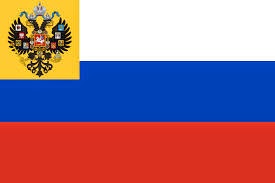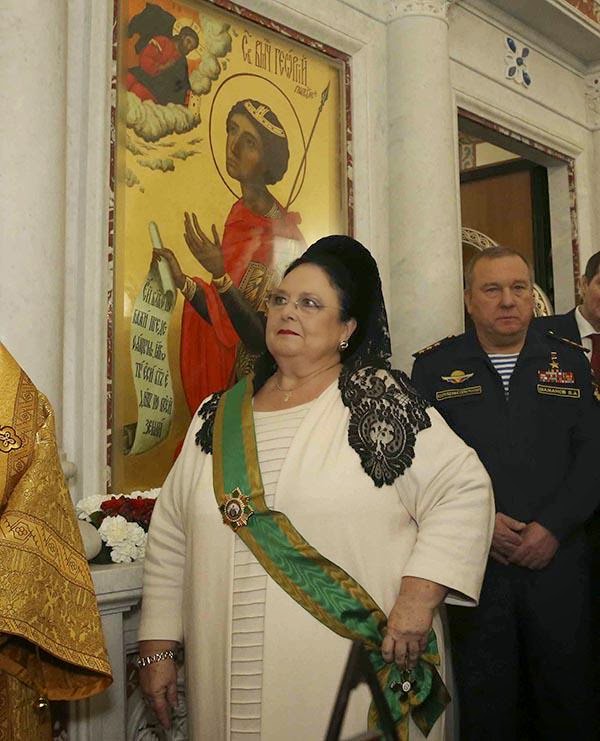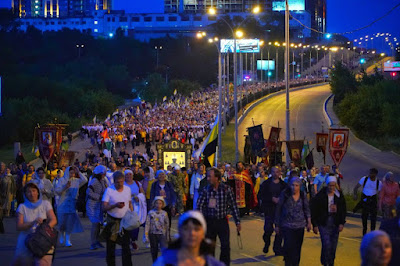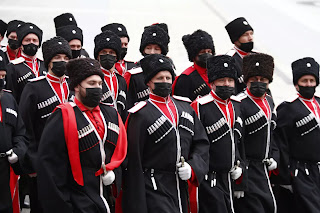
The ARNS Forum "Orthodoxy and the World in the 21st Century" was dedicated to the killing of the Russian Imperial family on July, 17 1918, at which he delivered a lecture "Empire. Image of the Future". Soon the Royal Procession begins from the Yekaterinburg Church on Blood, erected on the site of the regicide, to Ganina Yama, where the bodies of the martyrs were destroyed.
Konstantin Malofeev, the founder of Tsargrad, and head of the Double Headed Eagle Society said: "Every time I participate in this procession, I experience an amazing feeling of spiritual and national unity. But today it is special: many thousands of Russian Orthodox people who arrived in Yekaterinburg on the Tsar's Days are right now conciliarly praying to the Royal Passion-Bearers for the Russian Victory, stolen from us in 1917, when the Russian Empire was already preparing for the Bosphorus operation and the liberation of Constantinople."
The main procession of the year [video] - the Royal Way from the Yekaterinburg Church on the Blood to the Monastery of the Holy Royal Passion-Bearers on Ganina Yama - has been passed. The triumph of Russian unity, sanctified by Holy Orthodoxy, is revealed to the whole world. Feelings overwhelm: tens of thousands of Russian people united in spirit shoulder to shoulder in a single impulse.
Sverdlovsk Governor Yevgeny Kuyvashev appeared at the Divine Liturgy, which is the main event of the Tsar’s Days in Yekaterinburg. The religious procession from the city center to Ganina Yama began without the participation of the head of the region, a URA.RU correspondent reports from the scene.
“Column with the participation of metropolitans [Екатеринбургского] Evgenia and [Ташкентского] Vincent moved out from the Temple-on-the-Blood. Several thousand people are participating in the procession,” the correspondent said. It is planned that the pilgrims pursue to the village of Shuvakish, from where they turn to Ganina Yama. There is no exact data on the number of participants in the course yet.
The non-appearance of the governor at the procession of the religious procession is considered natural. According to URA.RU, since July 2021, Kuyvashev has been in extremely cold relations with Metropolitan Eugene (Kulberg). On the eve of last year’s religious procession, they had a conflict: due to the coronavirus pandemic, the head of the region banned the procession, but the bishop still called on the faithful to gather. Kuyvashev was pissed off.
Negotiations were conducted with the metropolitan, and he agreed to the only concession – he urged pilgrims to wear protective masks. Since then, relations between the two leaders have remained tense, according to rumors, they have never spoken in a year. This time, Kuyvashev was expected at the procession in connection with the upcoming gubernatorial elections: in September, the head of the region runs for a new term.
The last time Kuyvashev participated in the procession was in 2018, when the procession was timed to coincide with the 100th anniversary of the execution of the Romanov royal family. Then the Patriarch of Moscow and All Russia Kirill flew to Yekaterinburg. He was accompanied in the column by the first persons of the Sverdlovsk region, and in total more than 100 thousand people came out to that procession.
The expedition commander, cosmonaut Oleg Artemiev got in touch with the participants of the “Tsar’s Days” in Yekaterinburg. He greeted them during the night service, Metropolitan Eugene of Yekaterinburg reported on his telegram channel.
“Before the procession, during the night service at the Church on Blood, the pilgrims were greeted directly from the ISS by the expedition commander, Russian cosmonaut Oleg Artemyev. Let us pray to the Holy Great Martyr Catherine for our cosmonauts and wait for their return to Earth, hoping to share the joy of communion in the year of the 300th anniversary of Yekaterinburg,” the metropolitan wrote.
Artemiev, in turn, conveyed his regards to the pilgrims and congratulated the people of Yekaterinburg on the upcoming 300th anniversary of the “city of St. Catherine”. He showed that on board the rocket is an icon of the patroness of Yekaterinburg. After returning to earth, the cosmonaut plans to return it to the one who gave it – Metropolitan Eugene.
In Yekaterinburg, the Royal procession took place at night. It was attended by 50 thousand people, of which five thousand were pilgrims who came from other cities and countries. Earlier, the agency said that the head of the region, Yevgeny Kuyvashev, missed the procession, attending only the service. Before the start of the procession, one of the Yekaterinburg women fainted.
Russia: In Yekaterinburg, the procession in memory of the Romanovs gathered about 36 thousand people


































































